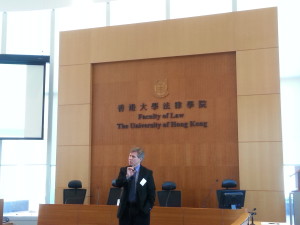Professor Randall Rader (George Washington University School of Law), former Chief Judge of the United States Court of Appeals for the Federal Circuit, who is now busy working as an arbitrator gave the keynote speech “US Patent System and the Lessons to Hong Kong”.
Professor Rader gave example of the blessings of the patent system by pointing to cancer research. Not only one cannot map the genome of healthy cells but also of cancerous cells. In the latter case there are many anomalies in the cell. Because there are so many, not one single inventor can come up with all medical solutions. Professor Rader argued that the patent system is crucial not only because it is a way for inventors to get a loan at a bank or be rewarded and continue their research, but because of the disclosures intrinsic to the patent system it is the way for other researchers to learn about the research and to collaborate and be linked to other scientists. Therefore the Hong Kong patent system can be a conduit for facilitating this international collaboration.
Most learning, Professor Rader, asserted goes incrementally, little by little. Unlike insights by people like Einstein, who happened to be a patent examiner at the Swiss patent office. Professor Rader pointed out the relation between Einstein’s work to examine the transmission of electric signals and electrical-mechanical synchronization of time, and his thought experiments that led him to his conclusion about the nature of light and the fundamental connection between space and time.
“Maybe the next Einstein was born in Manila or Hong Kong and can be identified by the patent system.”
Professor Rader argued that successful corporations can be identified by their IP. From idle ideas to profit via the patent.
According to Professor Rader Hong Kong is well positioned to a centre for adjudication, since the special administrative region has one foot in common law and one foot in the civil law.
Professor Rader argued that the grant of a patent to the inventor was a fundamental human right: dignity to the inventor for a valuable contribution to society, in many times a life’s endeavour.
For Professor Rader the question whether patents are stimulating or stifling innovation is unequivocally clear: each patent that is granted should by definition be an advance over the prior art. Professor Rader asserted that there is no such thing as the tragedy of the anti-commons in regard to inventions in biomedical research, and, referring to an article by Michael Heller and Rebecca Eisenberg “Can Patents Deter Innovation? The Anticommons in Biomedical Research” Science 280, 698 (1998), https://www.cornellcollege.edu/dimensions/workshops/reading-group-resources/science-280.pdf, said that it could not be proofed. However, I think it was Heller and Eisenberg’s goal to signal potential problems with the patent system. Therefore, one can argue that there is also no conclusive proof that the patent system is only beneficial for the creation of innovation.
See more of the Worldwide Patent Law Reform and Hong Kong’s Response HKU Workshop here: http://www.ipdragon.org/2015/01/17/worldwide-patent-law-reform-and-hong-kongs-response-hku-worksop/

